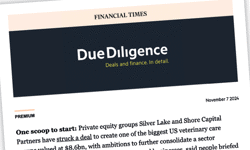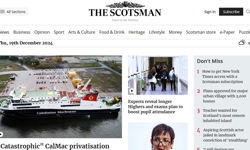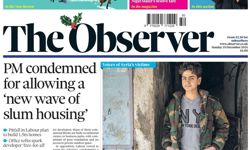Simon Fox, Trinity Mirror chief executive, stood in front of the national newspaper industry’s first big conference and systematically tore his prime product - the Daily Mirror - into smaller and smaller pieces.
As he did so, he told his audience of a recent trip to a leading advertising agency where executives were totally dismissive of the prospects for newspapers.
Don’t you realise that in the US, advertising revenue has halved in five years and that the UK will go the same way.
Rip.
What have you done, don’t you understand that selling CDs and DVDs – Fox came to Trinity Mirror from HMV - is nothing compared to the difficulty of selling more newspapers.
Tear.
Soon newspapers will only be used for lighting fires and cleaning shoes.
Shred.
Just when the audience was starting to worry where this apparently negative symbolism was going, Fox suddenly recreated a perfect Daily Mirror. Just like that.
There was an underlying sense of relief amid the laughter at the Newsworks conference at the British Library that Fox had successfully pulled off such a potentially problematical trick.
It helped of course that he is a member of the Magic Circle but there must have been some in his audience wondering whether the new chief executive can conjure up enough magic in the real world to improve the fortunes of Trinity Mirror.
Fall in profits
If Fox had any remaining illusions about the challenge he faces, they must have been dented in March. The announcement of a 75 per cent fall in pre-tax profits to £18.9 million in 2012 coincided with the arrest of four former and current journalists for alleged phone hacking.
The City, in what were probably exaggerated concerns about the scale of possible compensation payments, marked down the Trinity Mirror share price by 16 per cent on the day (March 14) to 101p. The share price had however been as low as 36p before Fox took over.
Once the sleight of hand was over, Fox, the outsider to the industry, outlined what he had learned in his first seven months in charge and what the industry needed to do to cope with the all too obvious challenges it faces.
The seven-month manifesto followed on from his first stab at suggesting solutions to the problems facing Trinity Mirror set out in an email to all staff a mere five weeks after taking over.
Apart from expressing increasing confidence in a business with “great brands, passionate and dedicated people and enormous potential”, Fox announced the creation of a single management structure for the company. It meant departure for Georgina Harvey, head of the regional business, and promotion for Mark Hollinshead who ran the nationals, to the new group-wide post of chief operating officer.
At the time, Fox also argued there was a need for an overall strategy for the company, print as well as digital, and criticised the “largely scattergun” approach to digital which had neglected, he argued, the development of Trinity Mirror’s core newspaper brands.
A new strategy
Six months later, Fox, who before HMV ran Comet, was able to articulate what he had found out and at least set out the bare bones of that strategy.
He had been surprised by how difficult and inefficient it is to book a press advertisement, particularly in the regionals, and just as surprised that circulation data is not published more regularly.
While television viewing figures are available within a day or two of transmission, the newspaper industry only publishes circulation figures monthly for nationals and six-monthly for regionals.
To improve selling, Fox has brought Trinity Mirror’s national and regional ad sales teams together under NASA – the Nationals Advertising Sales Agency. He also says monthly data will be available for the main paid-for Trinity Mirror regional dailies from the second half of this year and, if advertisers want it, they can have data on the nationals on a weekly or even daily basis.
The Trinity Mirror chief executive also called for more realistic data on digital, which avoids both duplication and counting page views.
In press, for example, the industry would never dream of using page view statistics.
“If we did, the Daily Mail, for example, would have 370 million daily page views compared to 57 million UK daily digital page views for MailOnline. This hyper-inflation in the language of digital is not helping anybody, least of all our advertisers”, Fox argued.
While emphasising the importance of digital, Fox insists that print will not be neglected and cited the launch of hybrid paid-for / free editions one day a week in cities such as Birmingham and Manchester. A new weekly free paper in Aberdeen, the Aberdonian, is being carried as an insert in the Daily Record.
The paywall question
And on the big question of the day that still divides newspaper executives – paywall or no paywall – Fox has jumped and taken a clear decision.
“We do not believe that paywalls would be right for any of our website brands at the moment”, said Fox.
“Our approach is to drive audience reach by improving the quality and content of our websites both nationally and regionally and drive commercial activity from them rather than putting up any barrier to their use”, he added.
The Trinity Mirror chief executive emphasised, however, he did not believe that there were right answers that applied across the board. Everyone in the industry had to keep experimenting, adapting and changing.
After his presentation, InPublishing asked Fox how he could increase substantially digital revenues in the absence of paywalls?
“You have to have sufficient readers online that you turn it into a commercial opportunity through related products. We don’t claim to have the answers, we need to use the audience and go for multiple revenue sources”, Fox replied.
The sort of things Fox has in mind range from additional advertising and commerce to bingo and betting products.
Trinity Mirror is also not doing enough with either blogs or video.
“We are not doing enough to be distinctive. We have a distinctive political voice and we have extraordinary columnists who take a different point of view – uniquely different - and we are not doing enough to bring that to our online sites”, says Fox.
The fact that some at least of the Sun’s sports offerings, such as Premiership clips from next season, are likely to disappear behind a paywall also represents an opportunity for Trinity Mirror.
“When you think where our papers are located - Manchester, Liverpool, Newcastle, Glasgow we have a huge network of journalists who are embedded with Premier League football and we need to do more to harness that”, Fox added.
How far has he got in his first seven months in a new industry?
“There has been frenetic activity. Perhaps the biggest change is the change to the culture, trying to make the business much more innovative, but in terms of what we have actually done, we have only started”, admits Simon Fox.
Other coffee break remarks apparently made to the Daily Telegraph by Fox led to an article claiming the Trinity Mirror executive had “lashed out” at his predecessor Sly Bailey because she had “set the bar low” on digital during her tenure. It was later claimed that Fox had made the remark in a light-hearted and jocular way.
Whatever was said in whatever tone of voice during a coffee break, the radical changes introduced by Fox in only seven months in charge amounts to an implicit criticism of what went before.
Lord Rothermere
From someone who measures his newspaper involvement in months to someone who has spent his entire life eating and breathing the business and who has been chairman of the Daily Mail and General Trust for 15 years – Lord Rothermere.
The headlines from the rare public appearance by the DMGT chairman were devoted obviously to his revelation that the company, which has also rejected the paywall approach, was “actively thinking” about experiments on a ‘freemium’ model.
“We will start experimenting with a freemium model which means we will probably have to invest in premium content to do that”, said Lord Rothermere who said the main aim was to double the size of MailOnline and compete against global operators such as Yahoo News and the Huffington Post.
“There are potentially much larger advertising revenues out there. If we don’t get to the right size then we will have to focus more on charging for content”, Lord Rothermere explained in conversation with the Newsworks chief executive Rufus Olins.
Lord Rothermere did not say what “the right size” for MailOnline would be, but by implication it would means regular users worldwide growing to something close to 200 million.
Premium content would be what people were prepared to pay for, but in such circumstances, the company would have to go into the rights business and video and sports rights would be crucial.
The DMGT executive was only one of a number at the Newsworks conference to pay tribute to the growing power and effectiveness of Twitter. The aim on MailOnline was to turn breaking Twitter stories around within a minimum of three minutes.
“Twitter could be a huge marketing tool for us if we used it more effectively. I don’t think we do that yet. As a primary source of material, we are finding it one of the most important source of news stories”, said Lord Rothermere.
Earlier Tony Gallagher, editor of the Daily Telegraph, told the conference that for breaking news, Twitter was now more important for his reporters than the Press Association.
At the session, Lord Rothermere was asked one final big question.
What was the one thing that kept him awake at night?
With a straight face, Lord Rothermere replied: “Guy Zitter’s expenses”.
The joke worked so well because, a bit like the frisson created by Simon Fox ripping up the Daily Mirror, the managing director of Mail Newspapers has been known to go to lunch.
(Picture by Robert Clayton.)












